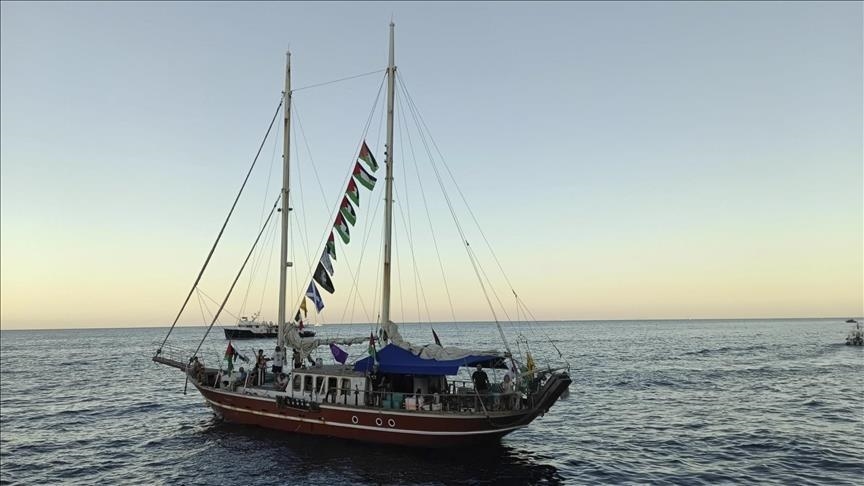News Flash

DHAKA, Oct 2, 2025 (BSS) - The Global Sumud Flotilla, an international civilian convoy carrying humanitarian aid and activists, has come under increasing pressure from the Israeli Navy. Despite aggressive interception attempts, organizers assert that many vessels remain committed to reaching Gaza, framing their mission as a defiant effort to break the prolonged maritime blockade.
On October 1, the flotilla reported that several vessels lost communications as onboard cameras went offline and GPS signals were disrupted, indicating targeted interference. The vessels faced interceptions, including a drone attack, followed by boarding operations by Israeli forces. Several activists were detained and taken away from the vessels, agencies reported.
Dawn reported that the flotilla declared it had been "illegally intercepted" and confirmed that at least three vessels had been boarded. Meanwhile, the flotilla also detected over 20 unidentified vessels closing in, suggesting a naval blockade was already forming.
AP reported that Israeli forces intercepted 19 of the flotilla's vessels about 70 nautical miles from Gaza. Some activists described the interceptions as involving naval warnings, threats of seizure, and the use of water cannons. Nevertheless, many boats reportedly continued forward motion despite the disruption.
Reuters reported that as the flotilla neared some 120 nautical miles from Gaza, unidentified or unlit vessels closed in on the convoy before dawn, making aggressive maneuvers while apparently jamming communications. That report noted that while the flotilla claimed drone attacks (including the use of stun grenades) and signal suppression occurred, Israel has not publicly confirmed those allegations.
In a follow-up Reuters piece, organizers said 13 aid boats had been intercepted, though 30 vessels continued onward toward Gaza. Among the detained was Swedish climate activist Greta Thunberg. Protesters decried the intercepts as acts in international waters, in breach of maritime law, and the incident sparked diplomatic backlash.
The Guardian also carried accounts of naval harassment; flotilla sources said Israeli vessels circled lead ships, jammed communications, and shadowed the convoy roughly 140 miles offshore. The paper reported that Italy and Greece had called on Israel to allow safe passage, while organizers rejected alternate deliveries via churches or third parties, insisting that direct maritime delivery is central to the mission's symbolism.
Other media outlets confirm flotilla vulnerabilities earlier in the voyage. AP reported that the flotilla endured drone attacks south of Greece, with resultant explosions and communication breakdowns. Though no casualties were reported, the attacks injected a new level of danger into the mission.
Earlier still, Reuters documented a reported drone strike in Tunisian waters on a Portuguese-flagged flotilla vessel docked at Sidi Bou Said. The vessel sustained fire damage; all aboard were unhurt. Tunisian authorities, however, denied any drone involvement.
The Sumud Nusantara Command Centre (SNCC), operating as the flotilla's coordination body, confirmed that two key ships-Alma and Sirius-were physically circled by a military vessel, which allegedly disrupted their CCTV and communication systems. SNCC described these acts as deliberate intimidation. Further, The Star (Malaysia) reported that an Israeli warship came within "just five feet" of Alma and jammed its systems, though it later withdrew.
AFP report cited a statement from Israel's Foreign Ministry, which reaffirmed that the nation would not allow vessels to enter what it considers an "active combat zone" or violate a "lawful naval blockade." The ministry offered an alternate route: dock aid at the Ashkelon marina for transfer into Gaza.
Political reactions abroad have been striking. Pakistan, alongside 15 other nations including Bangladesh, earlier issued a joint statement urging protection for the flotilla and respect for international law. Belgium specifically called for a "full and transparent investigation" into suspected drone strikes on flotilla vessels. In Southeast Asia, Malaysia condemned threats against the flotilla and called for immediate safe passage.
Al Jazeera reported that "over recent hours, Israeli forces have stopped 13 boats and arrested more than 200 people. Among those detained is Swedish climate activist Greta Thunberg."
According to the Global Sumud Flotilla live tracker, one vessel, Mikeno, is currently in Gaza's territorial waters. It remains unclear whether it has been intercepted by Israeli forces, the outlet added.
Israeli commandos continue to intercept flotilla boats, with the number of operational vessels now at 24, including several near Gaza's territorial waters.
Against this backdrop, Shahidul Alam's participation provides Bangladesh with a visible stake in the mission. While international outlets have spotlighted Greta Thunberg and European activists, the inclusion of a prominent South Asian photojournalist elevates the narrative in this region. Alam has said he carries "the love of all the people of Bangladesh" and labelled the Gaza situation as genocide.
Legally, the flotilla's confrontation with Israel raises thorny questions: interception of civilian vessels in international waters, the validity and proportionality of blockades, and the rights of neutral parties under the law of the sea. Israel claims its blockade is necessary for security, while critics say it is collective punishment in violation of humanitarian norms.
As the flotilla now sits in what organizers call a "high-risk area"-some 120 nautical miles or less from Gaza-its next moves will be crucial. Will it be forcibly stopped, detained, or perhaps partially escorted to land? Organizers insist that all actions are being documented in real-time to expose any violations.
Regardless of whether the flotilla reaches Gaza's shores, its journey has already challenged narratives around the blockade, rallied global attention, and forced a collision between non-violent protest and maritime confrontation.